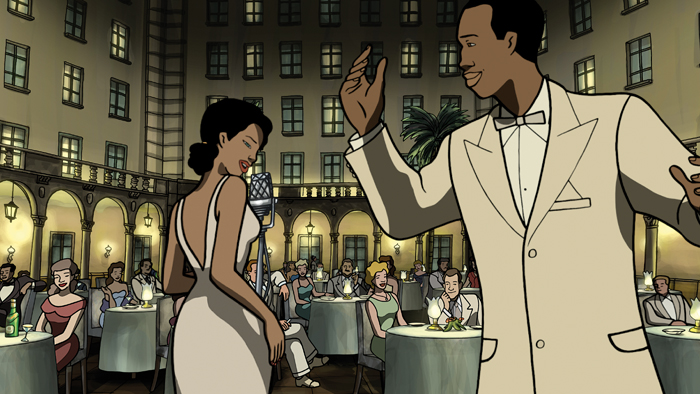As America once again pursues war, this time with Iran, it’s easy to remember how this super-power achieved its position of global hegemony. Cuba has felt the brunt of this American encroachment, having been under a national embargo since 1960, not to mention Guantanamo Bay. Tono Errando, Javier Mariscal and Fernando Trueba’s euphonic and bewitching animation explores life on this island before it fell foul of the world’s antagonist.
Searching for an accompanying singer, pianist Chico (Eman Xor Oña) happily stumbles upon undiscovered diva, Rita (Limara Meneses). However, it’s not long before Rita’s ensnared by an American agent. Chico’s left to travel to America with Ramón (Mario Guerra), unsure if he’ll ever see his bambino again.
Set in 1948, this pre-Castro love story is as much about music as it is the narrative. When characters aren’t performing, the soundtrack delivers an auditory fiesta worthy of the Buena Vista Social Club. Accompanying the Cuban melodies is a strikingly simple animation style, cleaner than Tatsumi and less CGI’d than Tintin, it presents colourful illustrations that complement the shifting emotions embedded in the narrative. While Chico and Rita’s relationship goes through many peaks and troughs, the film’s one constant is the negative influence of America. Despite the fact that the characters all aspire to perform in New York, from the devious behaviour of the American agent to New York’s cloudy weather, America is constantly portrayed as a meddlesome irritant, needlessly intervening to the detriment of those involved. Annoyingly, the U.S. has even wriggled its influence into the film’s “Hollywood-ised” ending, which is too neat and too convenient to fit the chaotic lives depicted in the rest of the movie. This film re-enforces the belief that, mostly, we are better off without assistance from Uncle Sam, because when he does help, he usually has his own interests at heart.
